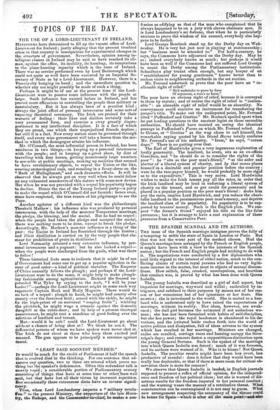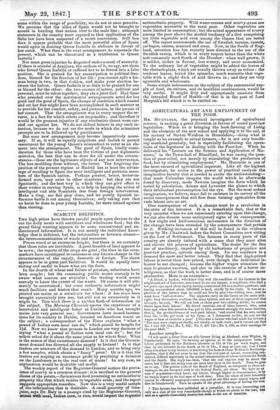THE SPANISH SCANDAL AND ITS AUTHORS.
THE issue of the Spanish marriage intrigues proves the folly of attempting to settle the state of Spain in London or Paris. But that was not the worst part of the method chosen. Had the Queen's marriage been arranged by the French or English people, it might have been with a view to the interests of the Spanish
nation; the French and English people had nothing to do with it. The negotiations were conducted by a few diplomatists who paid little regard to the interest of either nation, much to the con- flicting claims of certain royal persons who had no very legiti- mate interest. in the matter, but most to objects of mutual discom- fiture. How selfish, false, crooked, unscrupulous, and heartless that conduct was, is proved by what has been done with Queen Isabella.
The young Isabella was described as a girl of dull aspect, but impatient for marriage, wayward and wilful ; enthralled by in- triguers, and subdued to their purposes by means not of her rea- son or her conscience but of her ignorance or her fears. She marries ; she is introduced to the world. She is united to a hus- band who is understood only to have raised the expectations of marriage, without its reality. Her ideas, however are awak- ened ; the dull girl becomes the animated if not audacious wo- man ; she has not' been furnished with habits of self-discipline, but she has power; the royal beadsman is abandoned to his de- votions, and the irritated bride rushes forth into the world of active politics and dissipation, full of ideas adverse to the system which has resulted in her marriage. Ministers are changed, exiles are recalled, carriage races and hunting occupy the Sove- reign's days; and rumours fasten a supposititious distinction upon. the young General Serrano. Such is the upshot of the marriage into which Queen Isabella was forced : much of it was foreseen, and its authors were warned of it. Who is to blame? Not Queen Isabella. The peculiar results might have been less overt, less productive of scandal : does it follow that they would have been really less deplorable, or that if there is more room for critical ob- servation there is more for censure?
We observe that Queen Isabella is lauded, in English journals supposed to present a reflex of official opinion, for the independ- ence and freedom of her political ideas; but she is warned of dis- astrous results for the freedom imputed to her personal conduct ; and the warning wears the manner of a retributive threat. What counteraction can be contemplated it is not easy to guess. What new arrangement respecting the occupancy of the throne could be better for Spain—which is after all the main point—ookalso come within the range of possibility, we do not at once perceive. We presume that the allies of Spain would not be brought to accord in handing that-nation over to the male line ; although statesmen in the country most opposed to that application of the Salic law have been suspected of a secret conversion. Still less does it appear probable that the most powerful allies of Spain would agree in desiring Queen Isabella to abdicate in favour of her sister. What then is the next arrangement to supersede the present, which can be threatened as a retribution to Queen Isabella ?
Nor must gross injustice be disguised under a mask of austerity. If there is scandal at Aranjuez, the authors of it, we say, are those who forced Queen Isabella or suffered her to be forced into a false position. She is praised for her emancipation to political free- dom, blamed for the freedom of her life : you cannot split a hu- man being in two, in that fashion, and make your election be- tween the halves. Queen Isabella is as little to be praised for one as blamed for the other: the two courses of action, political and personal, must be taken together; they are a joint fact. Had those who presided over the matrimonial arrangements acted for her good and the good of Spain, the change of condition which roused and set her free might have been accomplished in such manner as to provide for her comfort, safety, and protection, in the person of her consort. That the arrangement was in every respect the re- verse, is a fact for which others are responsible; and therefore it would be the grossest injustice if any retributive threat were car- ried out against her. We do not indeed believe in any such in- tention, because we do not see the mode in which the minacious precepts are to be followed up by punishment. But some new arrangement may become imperatively neces- sary. If so, it will be equally iniquitous and foolish to permit resentment for the young Queen's misconduct to enter as an ele- ment into the arrangement. The good of Spain, kindly consi- deration for those who have been the victims of past diplomatic mistakes, the best that can be done for all under the circum- stances—these are the legitimate objects of any new intervention. The less meddling from without, the better. The forgiving dis- position of the present regime at Madrid has at least the advan- tage of recalling to Spain the most intelligent and patriotic mem- bers of the Spanish nation. Perhaps greater, better, better-in- formed men, may exist in other countries : but they are not Spaniards; and the best way in which they can give effect to their wishes in serving Spain, is to help in keeping the action of intelligent and able Spaniards free from foreign intervention. Make a ring, see fair play done, and let purely Spanish in- fluences battle it out among themselves ; only taking care that no harm be done to poor young Isabella, far more sinned against than sinning.



























 Previous page
Previous page